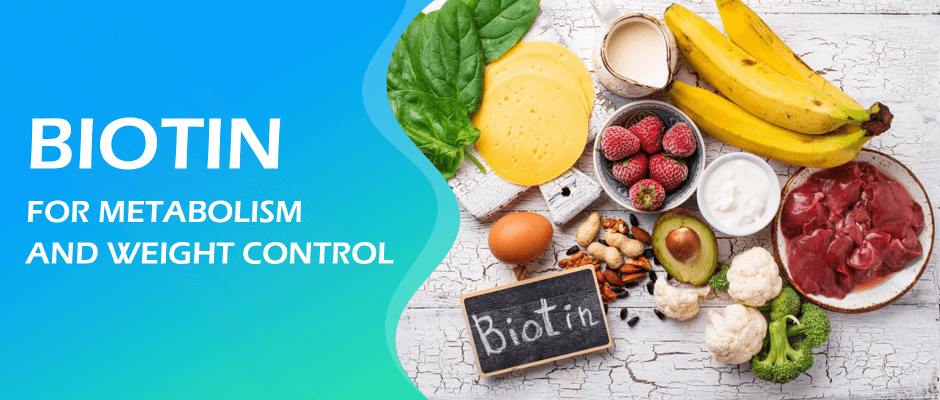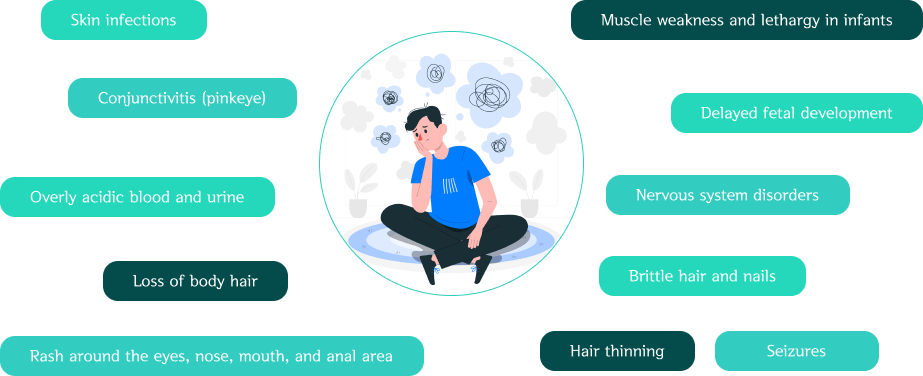
Biotin (vitamin B7) is a member of the B-complex family and an important coenzyme involved in multiple metabolic pathways. As a water-soluble vitamin, your body does not store biotin, and it needs to be replenished by one of two pathways: dietary, or via microflora synthesis in the large intestine.
Poor nutrition, use of antibiotics, and certain metabolic disorders can deplete biotin availability, contributing to obesity, sluggish metabolism and conditions affecting the skin and hair. Supplementing with biotin injection therapy can help increase biotin levels and boost metabolism.
Biotin Role in Human Health
In the human body, biotin serves as an essential coenzyme that supports five distinct carboxylases – enzymes that catalyze key reactions in the carbon cycle to drive energy production. Without sufficient biotin, precursor nutrients essential to the production of ATP – the energy molecule – cannot be synthesized in sufficient quantities to support cellular metabolism.
Biotin benefits include:
- Supports energy metabolism
- Promotes healthy skin, hair and nails
- Helps regulate blood glucose in type 2 diabetes
- Promotes fat metabolism
- Supports fetal and infant development

Supports energy
metabolism

Promotes healthy
skin, hair and nails

Helps regulate blood
glucose in type 2 diabetes

Promotes fat
metabolism

Supports energy
metabolism
Dietary Support for Biotin
B-complex vitamins are water-soluble, meaning they are quickly metabolized and not stored in your body. To optimize biotin levels, eat ample amounts of biotin-rich foods, and maintain a healthy gut microbiome by regularly consuming prebiotic and probiotic foods.
In food, biotin is largely bound to proteins, and found in abundance in animal sources like organ meats, egg yolks, beef, pork and salmon. People on vegan or low-protein diets are at higher risk of becoming B7-deficient. Because biotin plays a key role in fetal development, pregnant and nursing mothers should strive to meet dietary biotin requirements to optimize the health of their babies.
Your body can also manufacture biotin in the large intestine, provided your gut microflora are thriving. However, people with gut dysbiosis caused by antibiotic use or poor nutrition are unable to produce and transport adequate amounts of biotin to meet metabolic needs.
Prebiotics are foods that feed your gut microflora. They include:
- Greens like collard and dandelion
- Garlic
- Onions
- Bananas

Probiotics are live microorganisms found in cultured foods, including:
- Fermented foods like sauerkraut, kimchi and kombucha
- Cultured foods like yogurt, cottage cheese and sour cream
Both prebiotics and probiotics promote healthy digestion by helping to break down whole foods into their nutritional components, and by feeding gut microflora to support the synthesis of nutrients like biotin that support metabolic health.
Biotin Deficiency Causes and Consequences
Poor nutrition and gut dysbiosis are the key drivers of biotin deficiency, and they often go hand-in-hand with type 2 diabetes and obesity. Diets high in processed and fried foods, sugar, grains and gluten can contribute to gut dysbiosis that hinders digestion and suppresses biotin production.
One recent study highlighted a link between severe obesity and deficiency in gut bacterial biotin producers and transporters. Researchers concluded that combining biotin and prebiotic supplements can help reverse metabolic deterioration in severely obese people. Another study affirms that the composition and dysfunction of the gut microbiota are directly associated with the development of type 2 diabetes.
Biotin deficiency can lead to multiple health disorders, including:
- Hair thinning
- Loss of body hair
- Rash around the eyes, nose, mouth, and anal area
- Conjunctivitis (pinkeye)
- Overly acidic blood and urine
- Seizures
- Skin infections
- Brittle hair and nails
- Nervous system disorders
- Muscle weakness and lethargy in infants
- Delayed fetal development

Eating a nutrient-dense whole-foods diet high in greens and organic animal products can help to dramatically increase biotin availability while helping you to manage your body weight and lower your blood sugar. Avoiding processed and fried meats, and meats treated with antibiotics helps to protect your gut microbiome from deterioration.
Biotin for Weight Loss
Achieving and maintaining a healthy body weight is fundamental to wellness and longevity, but it is nearly impossible with a dysbiotic gut and a poor diet. To begin your weight loss journey, start by eliminating processed foods and sugar, and adding nutrient-dense whole foods that promote gut health. Supplementing with biotin injections can help you to metabolize fats and carbohydrates and regulate your blood sugar. NAD+ IV therapy can help to promote energy metabolism and weight loss. Both biotin and NAD are classified as nutrients, and do not require a prescription.
Injectable Biotin for Weight Loss and Metabolism in NYC
Managing your body weight not only improves the way you look and feel – it promotes longevity and enhances your overall quality of life. In the long run, adopting good lifestyle habits saves you time and money by preventing metabolic disorders that require medical intervention.
Losing weight is always challenging, but you don’t have to go it alone. At Invita Wellness, we provide weight loss solutions that promote health and longevity. Our convenient location and spa-like ambiance make Invita Wellness the clinic of choice for nutrient IV therapy, cryotherapy and hyperbaric oxygen therapy in Manhattan.
get the support you need for healthy weight loss
contact InVita Wellness today
Book Now
456 Broadway 2 Floor, New York, NY 10013, USA
Resources
Belda, Eugeni, et al. “Impairment of gut microbial biotin metabolism and host biotin status in severe obesity: effect of biotin and prebiotic supplementation on improved metabolism.” Gut 71.12 (2022): 2463-2480.
https://pubmed.ncbi.nlm.nih.gov/35017197/
Megur, Ashwinipriyadarshini, et al. “Prebiotics as a tool for the prevention and treatment of obesity and diabetes: classification and ability to modulate the gut microbiota.” International journal of molecular sciences 23.11 (2022): 6097.
https://pubmed.ncbi.nlm.nih.gov/35682774/
Wan, Zhijie, et al. “Intermediate role of gut microbiota in vitamin B nutrition and its influences on human health.” Frontiers in Nutrition 9 (2022): 1031502.
https://www.frontiersin.org/journals/nutrition/articles/10.3389/